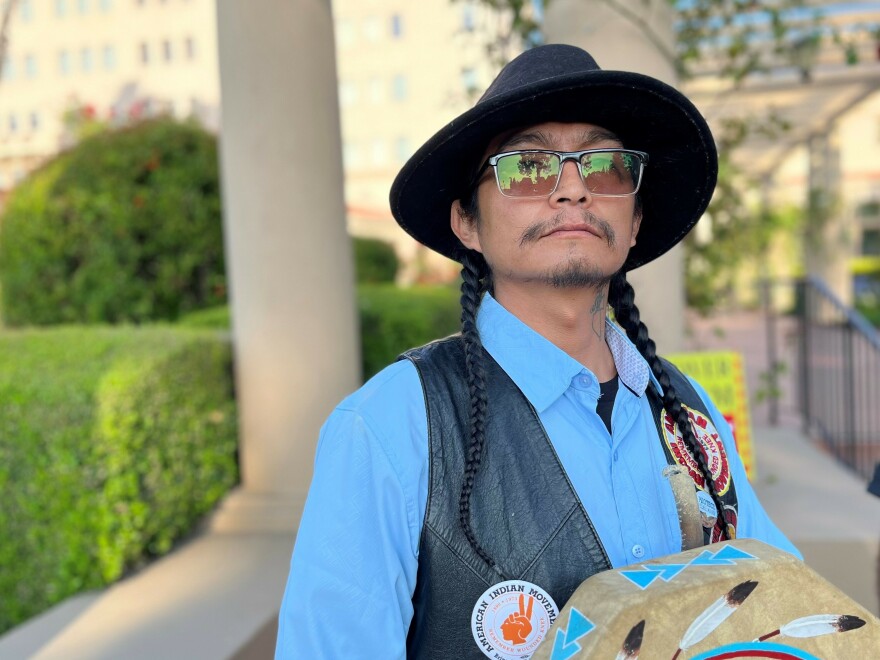PASADENA, Calif — The fate of what would be the largest lithium mine in the U.S. on federal land in Nevada is now in the hands of a federal appeals court.
It's the latest development in a more than two year legal battle over a plan by the Canadian firm, Lithium Nevada, to build an open pit mine near Thacker Pass, along a remote stretch of sagebrush-studded land close to the Nevada-Oregon border.
Initial construction has already begun on the mine after a district court ruling earlier this year upheld a federal plan permitting it. It would become one of the first major domestic sources of lithium, a key component in electric vehicle batteries. But the roughly 9-square-mile mine would also be on land considered sacred by some Native people.
Activists from western tribes packed a Ninth Circuit Court of Appeals courtroom Tuesday, some wearing traditional regalia, while others stood outside praying and singing.
Gary McKinney, an enrolled member of the Shoshone Paiute Tribe, wore a leather vest with an American Indian Movement emblem. He said federal land managers pushed the lithium mine through without considering its cultural significance.
"The world needs to know that this lithium mining, and this fast tracking of lithium mining, is a continuation of racism on Paiute and Shoshone people," McKinney told NPR.
Native people have gathered traditional plants there and conducted ceremonies, he said. The mine is also believed to be near the site of a massacre of Native people by the U.S. Cavalry in 1865.

"We're here to represent those fallen ancestors and continue our formal opposition of lithium mining," McKinney said.
A lawyer for the Biden administration told the three judge appeals panel inside the courthouse that tribes only brought the sacred land issue to light after the administration approved permitting the mine in early 2021. Laura Granier, lead attorney for Lithium Nevada, also argued the company had spent $8.7 million in environmental planning and mitigation efforts.
"There were no corners cut," she said.
Lithium Nevada has predicted it will be clear of legal and bureaucratic hurdles by this summer, with full construction at the mine site planned soon after. Corby Anderson, a metallurgist at the Colorado School of Mines, said the Nevada mine would be an important domestic source of lithium, which the U.S. currently imports primarily from South America now.
"If we don't permit and get this mine going, what happens to the next one? Do we wait ad infinitum?" Anderson asked. "Meanwhile there are stakes in the ground to create electric vehicles and require their use, we're going to have to go somewhere to get the lithium."
The fight over Thacker Pass puts the Biden administration in a bind. President Biden has called for a major transition to cleaner energy sources, emphasizing the need to electrify the country's transportation system. But the administration has also pledged to right historical wrongs in Indian Country.
Interior Secretary Deb Haaland, the country's first ever indigenous cabinet member, frequently touts that tribes finally have a seat at the table on federal lands decisions.
"The administration is taking intentional action to ensure that tribes have opportunities to weigh in before decisions are made that impact their communities because their voices, perspective and knowledge deserve respect," Haaland said at a conference in Idaho last Spring.
The Interior Department has repeatedly declined NPR's interview requests regarding Thacker Pass, citing the ongoing court cases.
Western tribal leaders have expressed growing frustration that they've as yet been unable to get Haaland and the administration's ear on the Thacker Pass dispute.
Arland Melendez, chair of the Reno-Sparks Indian Colony, acknowledged it's looking less likely tribes are going to be able stop or even delay the lithium mine for more studies of its cultural impacts.
"We want her to come out here at least to explain to the tribes as to what she can do besides remaining silent on it," Melendez said.
Melendez's tribe has filed a separate federal lawsuit alleging that federal land managers did not properly consult with area tribes before greenlighting the lithium mine. A ruling in the Ninth Circuit case is expected later this summer.
Copyright 2023 NPR. To see more, visit https://www.npr.org.



